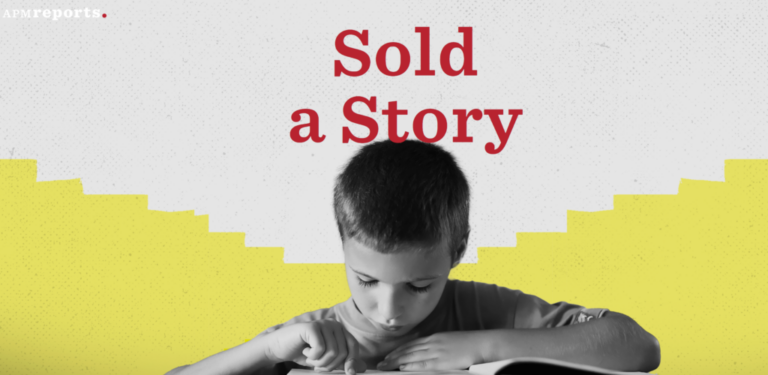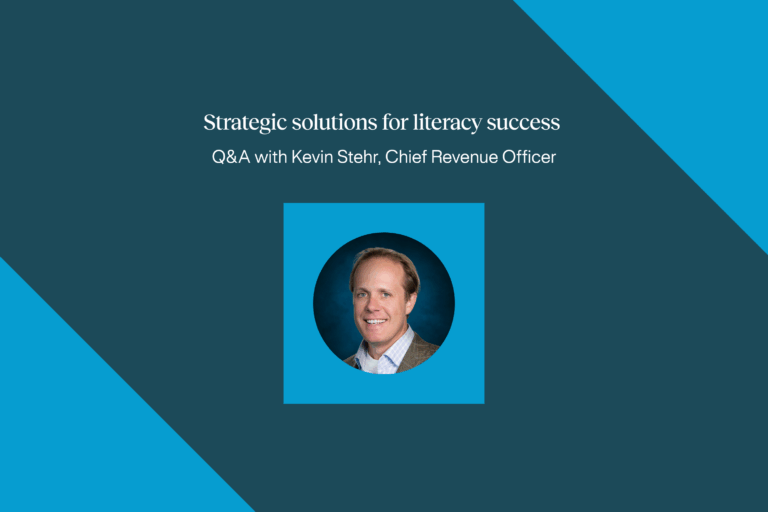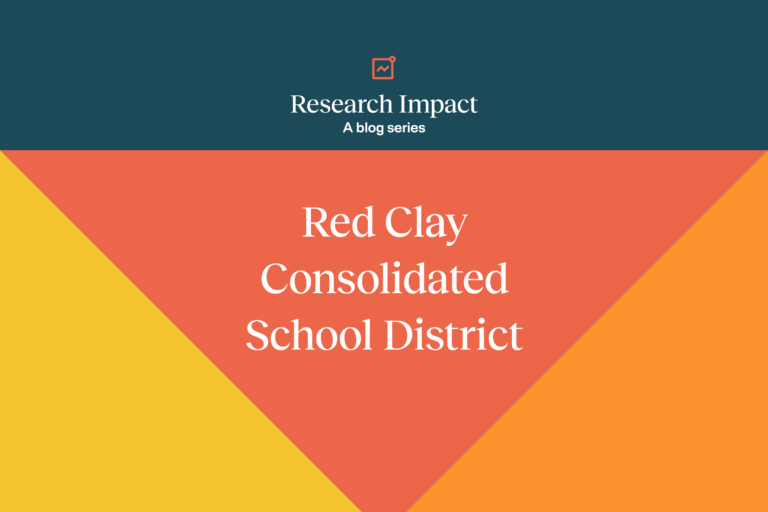Sold a Story: Learning brings discovery
In her second reflection on the new podcast series, Sold a Story by Emiliy Hanford, Laura Stewart, Chief Academic Officer and literacy expert, shares insights on Episode 5 and how we can all move literacy forward together. The episode focuses on a major publisher whose books and products have been highly influential. To quote Hanford: “The company’s products are in schools all over the country. Some of those products are rooted in a debunked idea about how children learn to read. But they’ve made the company and some of its authors millions.” Read on for more.

Turning to Wonder
Listening to Sold a Story Episode 5 made me turn to wonder. What if we in the literacy community could find meaningful points of consensus? If publishers, researchers, thought leaders, educators, administrators, and parents all joined forces? What if we looked for those intersections in our work and elevated those? What if we took the stance of moving forward together from here?
A little over two years ago, I started meeting with a group of similarly curious people in order to start talking about those “what ifs.” Our plan was to invite people from “different areas of emphasis” (avoiding “balanced literacy” vs. “science of reading”) to come to the table and have a facilitated discussion to hone in on those areas of consensus and send a unified message to stakeholders and the public-at-large that the “reading wars” were over. We reasoned that there was no sense in continuing any sort of “us vs. them” thinking; surely there could be settled learning for everyone involved. We even envisioned a retreat setting, with the end result being a published paper on, as Oprah would say, “Things We Know For Sure.” Well, you know the rest of the story. . . like all other disruptions, the pandemic diverted our plans.
But we kept on meeting to discuss topics that were swirling around in the community and to continue to lean into our original goal. Our group became larger and more voices were welcomed. We even started calling ourselves the “Peaceniks,” so we would remember why we started on this journey together.
While have had lively discussions, and have produced a paper based on what we see as a common area of interest, we still wonder about the fundamental question of the best way to build those bridges.
Turning to Action
Sold a Story episode 5 focuses on Heinemann Publishing Company, and specifically on the resources they have published which have built an empire on an instructional philosophy and methodology we now know to be detrimental to many of our emerging readers. This brings up a lot of emotions; for me, perhaps outrage mixed with guilt. And there’s mostly sorrow—sorrow for the kids who weren’t served well. All those emotions are justified. Let’s accept that and acknowledge that. Then, we turn to action.
Of course, the action we would hope to see is that publishing companies would align themselves with the preponderance of evidence around effective instruction and produce materials that allow a teacher to actualize that in her classroom. But we have no control over that. We have no control over whether a for-profit company decides to build a bridge from that which built their empire to something different. I would suggest that the key action to be taken is to build whatever bridges we CAN build.
Be a Trailblazer
As educators, we can build our own bridges of knowledge between what we know now and any new evidence that will impact our practice. I know this is a challenge, but there are more accessible resources out there now than ever to support you on your journey. If you are a teacher in a school where ineffective materials are pervasive, you may need to be that trailblazer with a different approach, bringing curiosity to the forefront for your peers. If you are an administrator, you have the opportunity to have that courageous conversation with your colleagues around the data in your school: What students are being left behind and why? What will be uncovered is that instruction will make a difference, and the materials used in that instruction really matter. If you are a curriculum leader, become a conscious and knowledgeable consumer. When making curricular decisions, choose wisely: Make sure your expert internal stakeholders weigh in on these purchases, look at efficacy research for each product you are considering, and fairly and objectively evaluate the evidence. This way you CAN hold publishers accountable for putting the best resources out there base on the evidence.
Regardless of what bridge each of us decides to build, I suggest we surround ourselves with community and that within that community we listen to our own convictions as well as the convictions of others, so that we can find the path forward from here. Like my beloved Peaceniks, start from a place of curiosity, and as Parker Palmer says, “When the going gets rough, turn to wonder.”
Suggested Resources for Your Science of Reading Journey
There are more resources out there now than ever to support you on your journey. If you are a teacher in a school where ineffective materials are pervasive, you may need to be that trailblazer with a different approach, bringing curiosity to the forefront for your peers. If you are an administrator, you have the opportunity to have that courageous conversation with your colleagues around the data in your school. If you are a curriculum leader, become a conscious and knowledgeable consumer. Following is a list of initial, suggested resources from Laura Stewart.
Beginning Steps
The Reading League Defining Guide
The Ladder of Reading and Writing by Nancy Young
What is Structured Literacy? from the International Dyslexia Association
Websites to Visit and Explore More
Reading Universe
Reading Rockets
Florida Center for Reading Research
For Administrators
Science of Reading Implementation Guide for Administrators
Next Steps for Further Study
How We Learn by Stanislas Dehaene
Language at the Speed of Sight by Mark Seidenberg
Reader, Come Home by Maryanne Wolf
Essentials of Assessing, Preventing, and Overcoming Reading Difficulties by David Kilpatrick
Explicit Instruction by Anita Archer and Charles Hughes
The Knowledge Gap by Natalie Wexler
The Art and Science of Teaching Primary Reading by Christopher Such
About Laura Stewart
Laura Stewart, Chief Academic Officer, is a nationally recognized Science of Reading and Structured Literacy advocate and expert who will serve as the company’s spokesperson and will continue to build its thought leadership position in the literacy market. Stewart has dedicated her career to improving literacy achievement at leading education companies including The Reading League, Highlights Education Group, and Rowland Reading Foundation.



